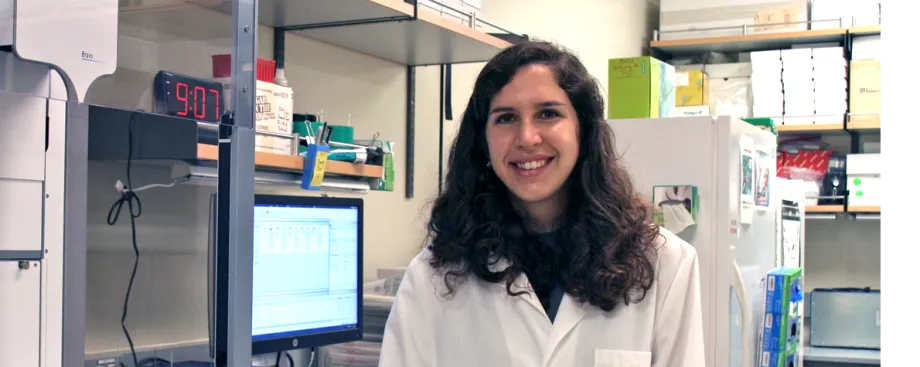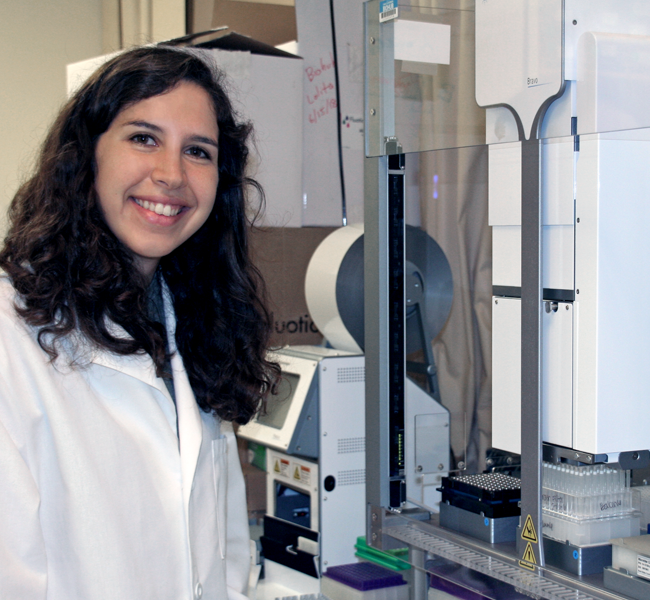
Stanford Bio-X Bowes Fellow Mira Moufarrej in Dr. Stephen Quake's lab in 2018.
Stanford Today - April 27th, 2021 - by Taylor Kubota
Mira Moufarrej, a 2018 Stanford Bio-X Bowes Fellow and a graduate student in bioengineering, has been awarded a 2021 “Cure it!” Lemelson-MIT Student Prize for inventions related to prenatal and maternal health.

Stanford Bio-X Fellow Mira Moufarrej in the lab in 2018.
This $15,000 prize celebrates young inventors and is given based on overall inventiveness, the invention’s potential for scalable commercialization or adoption, and youth mentorship experience. The prize is supported by the Lemelson Foundation and administered by the School of Engineering at MIT.
Moufarrej is being recognized for three new screening tests that predict preterm birth, preeclampsia – a pregnancy complication characterized by high blood pressure and potential organ damage – and due date. Moufarrej is also recognized for her mentorship work, which includes serving as a mentor for Stanford Women in STEM, the Stanford Bioscience Student Association and the Stanford Undergraduate Research Association.
“Like many areas of women’s health, pregnancy is understudied. When I started in this area of research, I was surprised to learn how little we know about pregnancy, even though every one of us is a result of it,” said Moufarrej. “These blood tests will empower mothers with concrete data to more strongly advocate for themselves during pregnancy and seek appropriate medical care early enough for non-emergency intervention.”
The three tests Moufarrej has developed measure RNA – a messenger molecule that changes over time, including in response to pregnancy – and use a blood sample that can be obtained in an outpatient setting. Preeclampsia and preterm birth are potentially life-threatening conditions and, by allowing for earlier predictions of these conditions, Moufarrej hopes her inventions can help mothers receive the help they need before they require emergency intervention. In particular, she recognizes the potential for her work to benefit Black mothers, who are disproportionately affected by preeclampsia and more likely to die during childbirth than white mothers.
This recognition has encouraged Moufarrej to more fully comprehend her identity as a scientist, which she has had doubts about in the past.
“Seeing myself as a scientist has evolved over time, and winning the Lemelson-MIT award is a great validation that I am an inventor and a scientist, and I’m very proud,” said Moufarrej.
The startup Mirvie has licensed the preterm birth test technology and is conducting pre-clinical validation testing. Moufarrej has also submitted a patent application for the preeclampsia test, and her work resulted in an inexpensive, semi-automated system to enable small labs to perform large-scale sample processing for RNA sequencing. She has made information for this invention available to the public.
Moufarrej also joins her advisor, Stephen Quake, among the Lemelson-MIT award winners. Quake, the Lee Otterson Professor in the School of Engineering, professor of bioengineering and of applied physics and co-president of the Chan Zuckerberg Biohub, won the $500,000 Lemelson-MIT Prize in 2012 for numerous “groundbreaking inventions in personalized medicine, drug discovery and noninvasive diagnostics, among other areas.”

